英语写作基础教程3
大学英语写作教程第三册unit sentence variety
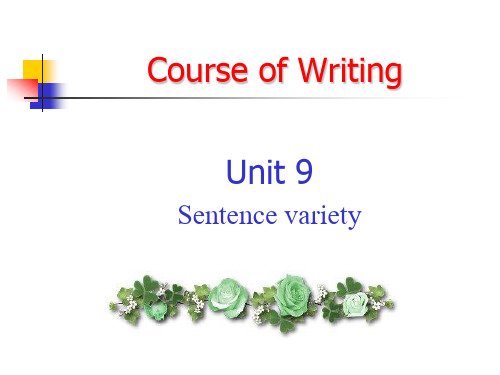
9.1 Sentence Variety
Complex:
sentences that consist of two or more simple sentences connected by subordinators.
The group of sentences in a paragraph should be regarded as a whole and should be different enough in types to avoid boredom. This is called sentence variety
Course of Writing
Unit 9
Sentence variety
Teaching objective today
1. The importance of sentence variety. 2. Learn to improve sentence variety in terms of
9.1 Sentence Variety
2. Ways to achieve Sentence Variety: To use different types of sentences
1)types of sentences: Sentence classification
9.1 Sentence Variety
1)types of sentences:
Sentence classification according to functions
interrogative
Declarative
Sent ence func tion
imperative
exclamatory
英语写作基础教程答案第三版 丁往道chapter3
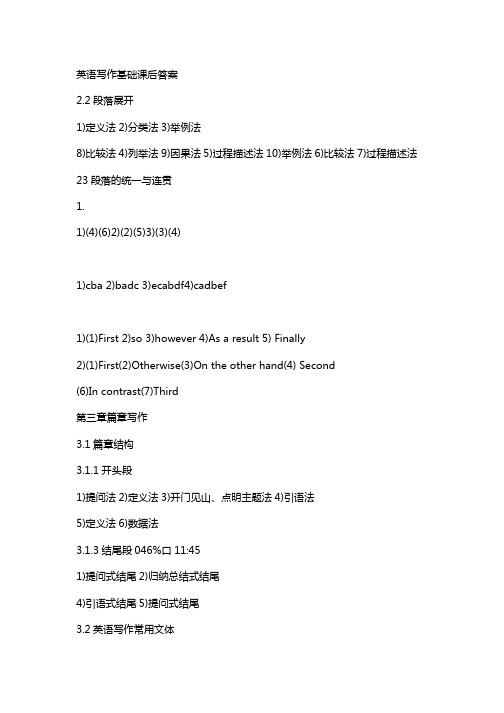
英语写作基础课后答案2.2段落展开1)定义法2)分类法3)举例法8)比较法4)列举法9)因果法5)过程描述法10)举例法6)比较法7)过程描述法23段落的统一与连贯1.1)(4)(6)2)(2)(5)3)(3)(4)1)cba 2)badc 3)ecabdf4)cadbef1)(1)First 2)so 3)however 4)As a result 5) Finally2)(1)First(2)Otherwise(3)On the other hand(4) Second(6)In contrast(7)Third第三章篇章写作3.1篇章结构3.1.1开头段1)提问法2)定义法3)开门见山、点明主题法4)引语法5)定义法6)数据法3.1.3结尾段046%口11:451)提问式结尾2)归纳总结式结尾4)引语式结尾5)提问式结尾3.2英语写作常用文体l.1)说明文2)议论文Il.(For reference only)3)叙述文(5)However(8)And(9)But(10)In spiteof3)个人见解式结尾6)归纳总结式结尾Spring Festival is a wonderful time of the year to spend with one's family. People who work and study far away from their homes come back.Theytell each other about their work and life,exchange gifts and eat lots of delicious food with their family members.Spring Festival is also a great time to visit one'sfriends.During the holiday, many people go to see their friends and share their interesting stories or workexperiences.Students love to go out with their formerclassmates and enioy talking about their life.Manystudents also like to visit their teachers and wish them a happy new year However, there are times during the Spring Festival when it's nice iust to be by yourself. You can read novels that you never seem to have time to read at school.You can watch your favorite TV programs athome.You can have a quiet walk in your neighborhood or in a park nearby and think about your busy life. Spring Festival is an enjoyable time for everyone46%口11:46II(For reference only)A proverb says,“Time is money.” But in my opinion time is even moreprecious than money because when money is spent, we can earn it back; but when time is gone, it will never return.Thus we must value time.Time passes very quickly.Some students say they do not have enough time for all their lessons.Actually they do not know how to make use of their time.They spend their precious time smoking,drinking, chatting, playing games and doing other useless things.They don't realize that wasting time is equal to wasting a part of their valuable life.Today we are living in the twenty-first century.We know that time is life.When a person dies, his time has ended.Since life is short,we should devote our time and energy to our studies so that we will be able to serve our country and society.We should form thehabit of saving time.We shouldn 't put off what can be done today till tomorrow Laziness will not only bring us failure but also lead us to the road of poverty.。
英语写作教程3,4单元
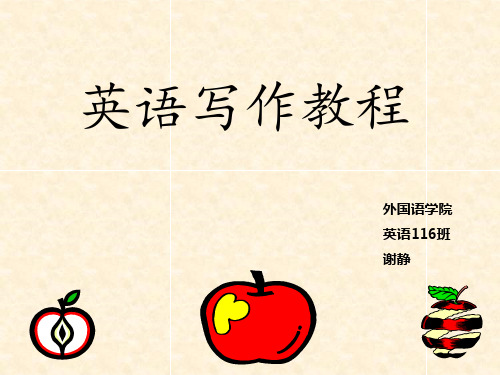
• 1,Fragmented subordinate clauses 破碎的从属分句 • The decision seem fair. Because it consider all parties. • The decision seem fair because it consider all parties. • The decision seem fair. It consider all parties. • To earn some pocket money, you only need an odd job. While to accomplish something remarkable(非凡的),you must spend lots of time and energy.
• • • • •
3,Other fragmented word groups P28 parts of compound predicates 复合谓语 appositives 同位语 lists example introduced by“such as”,“for example”or similar expression • eg.I like fruit.such as apples,bananas. • I like fruit such as apples,bananas.
英语写作教程
外国语学院
英语116班
谢静
Unit 3
---常见的句子失误
1.Sentence Fragments ma Splices 3.Run-on Sentence
破碎句 逗号误用 粘连句
A complete sentence 1,contains a subject and a verb eg. I like apples. 2,is not a subordinate clause(从句)
英语写作基础教程(第三版)chapter
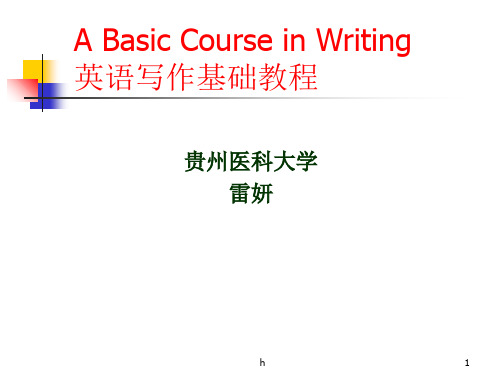
and a few books - are here. (4). introduce a summarizing clause after a series of
h
11
一、Manuscript Form
1. Arrangement
(10) attention: Never begin with a comma(,), a period(.), a colon(:), a question mark (?), an exclamation mark(!)
Never ends with 【 “ ( h-
h
20
二、 Punctuation
3. The Dash / Hyphen (-)
(1). indicates a break in thought or a change in tone, or a speaker's confusion or hesitation e.g. Many people went there - did you go?
2. The Period (.)
(1). used at the end of a declarative sentence, a mildly imperative sentence, and an indirect question
(2). Abbreviations U.S.A. a.m.
(3). Three spaced periods make the ellipsis mark
英语写作基础教程3

英语写作基础教程A Basic Course in Writing主讲: Priscillapan教学大纲一. 教学对象本课程的教学对象是高等专科英语专业的学生或具有同等水平的自学者._二. 教学目的与要求通过本课程的教学,使学生初步掌握英语写作技能,学会用英文写叙述,说明性的短文和一般性应用文.(1) 用英文写叙述,说明性的短文:要求学生能根据命题列出作文提纲,在1小时内写出不少于200词的短文, 内容切题,完整,条理清楚,语句连贯通顺, 语法基本正确.(2) 用英文写一般性的应用文:要求学生能根据提示写出知,贺卡,便条,申请书,邀请函,简历,格式正确,语言得体。
_三. 教学安排本课程3个学分, 在一个学期内开设, 每周3学时,共计54学时。
_四. 教学内容本课程主要教学内容如下:(1) 文稿格式;(2)句子结构;(3) 构段方式;(4) 谋篇布局;(5)摘要;(6) 应用文。
_五. 教学原则(1)在教学过程中, 要充分考虑成人学习的特点和本课程的特点, 注重对学生遣词造句这两种能力的培养;(2) 在教学过程中, 教师应以指导学生自学为主,以电视教学和课堂教学为辅,采用多种教学手段对学生进行写作训练。
_六. 测试_实行全国统一的闭卷考试.考试采用百分制,60分及格.实施方案一,课时安排____”英语写作基础”课内总学时为54小时,课外练习时数为54小时。
二,具体学习安排___ (一)基本技能的学习:6课时,要求掌握标点符号的用法.__ (二)句子的写作:9课时,要求掌握句子统一性,连贯性,重点突出的写作技巧.__ (三)段落的写作:6课时,要求掌握段落统一性的写作,学会主题句和扩展句的运用。
__ (四)一般性文章和应用文的写作:30课时,要求掌握基本应用文的写作,这是本课程的重点部分(具体内容附后).__ (五)期末复习:3课时,全面复习本学习的教学内容,模拟考试。
三,教学意见____ 1)作文课应该以教师讲解,学生练习为主。
高考英语写作基础 Unit 3 (2)讲义+练习(必修1,含解析)
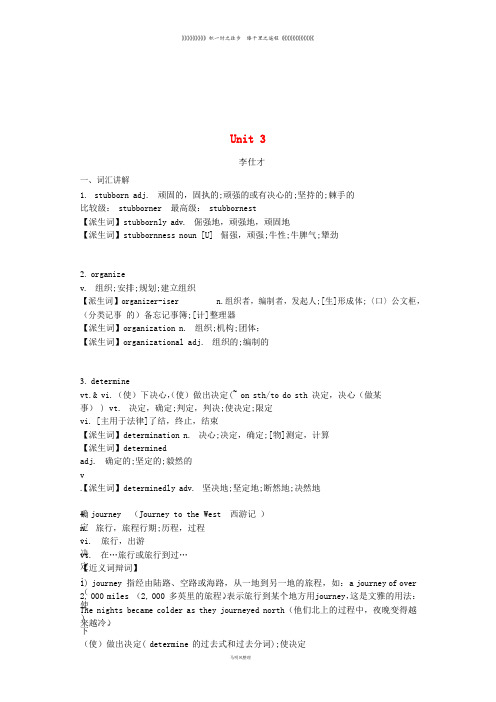
Unit 3李仕才一、词汇讲解1. stubborn adj. 顽固的,固执的;顽强的或有决心的;坚持的;棘手的 比较级: stubborner 最高级: stubbornest 【派生词】stubbornly adv. 倔强地,顽强地,顽固地【派生词】stubbornness noun [U] 倔强,顽强;牛性;牛脾气;犟劲2. organizev. 组织;安排;规划;建立组织【派生词】organizer-iser n.组织者,编制者,发起人;[生]形成体;〈口〉公文柜,(分类记事 的)备忘记事簿;[计]整理器【派生词】organization n. 组织;机构;团体; 【派生词】organizational adj. 组织的;编制的3. determinevt.& vi.(使)下决心,(使)做出决定(~ on sth/to do sth 决定,决心(做某事) ) vt. 决定,确定;判定,判决;使决定;限定 vi. [主用于法律]了结,终止,结束【派生词】determination n. 决心;决定,确定;[物]测定,计算 【派生词】determined adj. 确定的;坚定的;毅然的v . 确定;决定;(使)下(使)做出决定( determine 的过去式和过去分词);使决定【派生词】determinedly adv. 坚决地;坚定地;断然地;决然地 4. journey (Journey to the West 西游记 ) n. 旅行,旅程行期;历程,过程 vi. 旅行,出游 vt. 在…旅行或旅行到过… 【近义词辩词】 1) journey 指经由陆路、空路或海路,从一地到另一地的旅程,如:a journey of over 2, 000 miles (2, 000 多英里的旅程)。
表示旅行到某个地方用 j ourney ,这是文雅的用法:The nights became colder as they journeyed north (他们北上的过程中,夜晚变得越来越冷)。
英语写作基础教程(第三版)chapter

and a few books - are here. (4). introduce a summarizing clause after a series of
h
15
一、Manuscript Form
4. Handwriting
(1) little space (about one letter) after a comma, and a slightly bigger space (about two letters) after a full stop.
h
18
二、 PuncBiblioteka uation1. The Comma (,)
(4). Nonrestrictive clauses and phrases are
Set off by commas.
(5). Commas set off parenthetical elements.
(6). In dates, a comma is used to separate
nouns e.g. Bob, Lily, Judy - none of them know where he is. (5) used like quotation marks in a dialogue. (6) introduce subheading and authors after quotation
h
17
二、 Punctuation
1. The Comma (,)
大学英语写作教程第三册unit--sentence-variety课件

The group of sentences in a paragraph should be regarded as a whole and should be different enough in types to avoid boredom. This is called sentence variety
The boys leaned against the willow tree (growing) next to the stream, their fishing poles resting on sticks, their eyes gazing at the bobbers on the ripples. The morning had been cool and comfortable, but the afternoon was becoming very hot. Both boys had taken great pleasure in planning for the trip on Friday, their only day off in the whole month.
n Conclusion: Sentences with different lengths are more desirable in writing.
18
9.1 Sentence Variety
n Follow-up activities: p144
n Reference for the Classroom Activities:
1 ) types of sentences:
写作教程 3 Unit 2
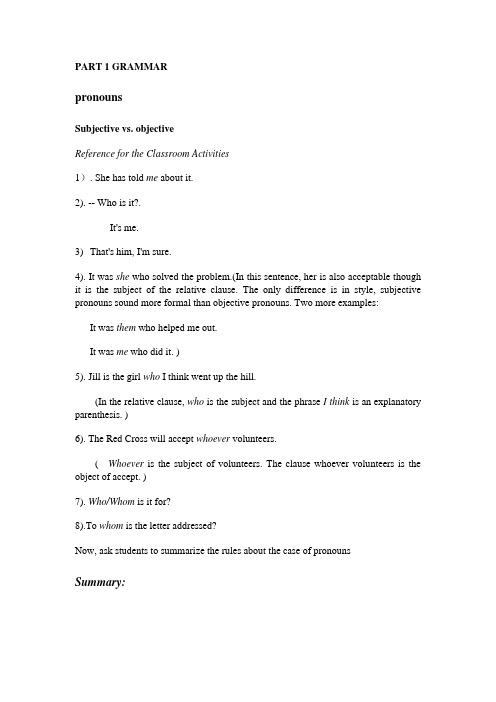
PART 1 GRAMMARpronounsSubjective vs. objectiveReference for the Classroom Activities1). She has told me about it.2). -- Who is it?.It's me.3)That's him, I'm sure.4). It was she who solved the problem.(In this sentence, her is also acceptable though it is the subject of the relative clause. The only difference is in style, subjective pronouns sound more formal than objective pronouns. Two more examples:It was them who helped me out.It was me who did it. )5). Jill is the girl who I think went up the hill.(In the relative clause, who is the subject and the phrase I think is an explanatory parenthesis. )6). The Red Cross will accept whoever volunteers.( Whoever is the subject of volunteers. The clause whoever volunteers is the object of accept. )7). Who/Whom is it for?8).To whom is the letter addressed?Now, ask students to summarize the rules about the case of pronouns Summary:1.Subjective pronouns can be used as the subject or part of the predicate of asentence, while objective pronouns can be used as the object of either a verb or a preposition.2.Both subjective and objective pronouns can be used as part of a predicate and thedifference lies in style. If a subjective pronoun is used, it sounds formal and,therefore, is usually preferred in formal writing. If it is an objective pronoun that is used, it sounds colloquial and is, therefore, preferred in informal speech.3.Phrases like I think, I believe, I suppose, when inserted into a clause, do not affectthe roles of the other components in the clause.4.when the interrogative pronoun is not the first word of a question, standard usagehas not yet given up whom after a preposition or at the end of the question: For whom was the party given? You listened to whom? With whom did you go?However, popular usage gas been moving towards the elimination of whom,especially when it comes first in a question. Who is it for? Who did you meet?Who are you looking for?Singular vs. pluralReference for the Classroom Activities1). Someone left his or her umbrella on the train. (One person left one umbrella. )b. Everybody drove his own car to the camping site. (Each person got into his own car and drove it. )c. No one likes to be forced to do what he doesn't like. (Focus should remain on individual's freedom. )d. (correct) (Although everyone looks singular and is often followed by a singular verb,this sentence would be illogical if carried out in the singular: Everyone was in the classroom, but he has left to get pizza. )e. (correct) (A number of people left a number of raincoats. )Now, ask students to summarize the rules about the number of pronouns Summary:e a singular pronoun when the intent of the antecedent is singular. An indefinitepronoun, like someone, everyone, no one, and one, is usually considered to be singular and referred to with singular pronouns, but sometimes it is used in the plural sense and form.e a plural pronoun when the intent of the antecedent is plural.Point of viewReference for the Classroom ActivitiesRevised version 1:When people read about a natural disaster in another country, it hardly affects them. Of course, they feel bad and upset when people get killed. But as these disasters happen thousands of miles away from them and because they don't affect their own life, they are not traumatized by them. If a flood killed their own close friends, they would be more emotionally upset.Revised version 2:When we read about a natural disaster in another country, it hardly affects us. Of course, we feel bad and upset when people get killed. But as these disasters happen thousands of miles away from us and because they don't affect our own life, we aren't traumatized by them. If a flood killed our close friends, we would be more emotionally upset.Notice while the first version is comfortable and respectable, the second one involves the audience more effectively and directly because of the use of the pronoun we. The pronoun you can also achieve the same effect in this paragraph.Now, ask students to draw a conclusion from the activitySummary:One of the problems about the point of view is a careless shift from one subject to another within a sentence or from one sentence to the next. The solution is to rewrite the paragraph using a consistent presiding pronoun, or point of view.PARTⅡFOLLOW-UP EXERCISES1. 1). In this excerpt, Liza's style is all but appropriate for the occasion. At thebeginning, she chooses a formal and affected style but later slides to colloquial and finally slang expressions. The other characters at the scene use general and colloquial vocabulary that is appropriate for the context.2).No. Here the obvious switch from a formal to a highly colloquial styleshows Liza in a transitional stage. She does not see that her learned comment on the weather is posed to be a lady and reverts to her natural speech, which incidentally is much more expressive and colorful than her phony(假冒的)formality(礼节).2. 1). play a minor role/be a utility man2). That's Greek to me.3). belated action/advice4). Where there is smoke there's fire.5). an evil creature6). walk into the trap7). one's face glowing with health3. 1). We must practice economy. / We must reduce unnecessary expenditures.2). It is essential to control environmental pollution.3). We must arrive at the station on time.4). Financial expenditures should be arranged in order of priority.5). We should speed up constructions of urban housing so as to improve thehousing condition.6). To be allowed to make profits, private capital has to meet two conditions:1) theprofits must be legal, and 2) they must not be excessive.7). During the period of the Tenth Five-Year Plan we must never neglect grainproduction. Instead, we must steadily increase it.4. Reference versionWomen's RightsIn feudal China, women had low social status, and were regarded as inferior to men. Thanks to the women's liberation movement, women have achieved equal status with men, which is established by the law. But in fact, they still can't enjoy equal rights with men.At home, wives are expected to do all the housework, which is obviously unfair. Husband and wife should share the housework and family responsibilities. But in some families husbands usually get angry when they find the cleaning or cooking unfinished by their wives. One can't help wondering why they don't do it by themselves.I think women should be spiritually and financially independent if they want real equality. In order to do that, they have to learn as much as men so as to find a good job. Appearance is no longer important to women. It is their ability that can bring them a good job rather than their appearance. So I think the best way for women to win more rights is to receive good education.5. 1). me 2). who 3). I 4). me/ myself 5). me 6). each other’s7). who 8).us 9). whom 10). some 11) one’s 12). his13). his 14). his, his6 1). We are all born into this world as equals, but for various reasons, not all ofus are treated as equals. This inequality begins when we reach the age of five, for this is when we will enter elementary school. In school, we are no longer "Mommy's little darling." We now have to prove ourselves to the other children and also to our teacher. If we seem different from the other students, we are treated differently, and these differences could be anything: pants, shoes, speech, religion, and so forth. Right from the start, we think that as long as we are different, there is something wrong with us.2). There are those who assume that since I can't see, I obviously cannot hear.Very often people will talk with me at the top of their lungs, uttering each word very carefully. On the other hand, people will also often whisper, assuming that since my eyes don't work, my ears don't either. For example, when I go to the airport and ask the ticket agent for assistance to the plane, he or she will invariably pick up the phone, call a ground hostess and whisper: "Hi, Jane, we've got a 76 here." I have concluded that the word "blind" is not used for one of two reasons: either they fear that if the dread word is spoken, the ticket agent's retina will detach, or they are reluctant to inform me of my condition of which I may not have been previously aware.。
英语写作基础教程第三版课后答案
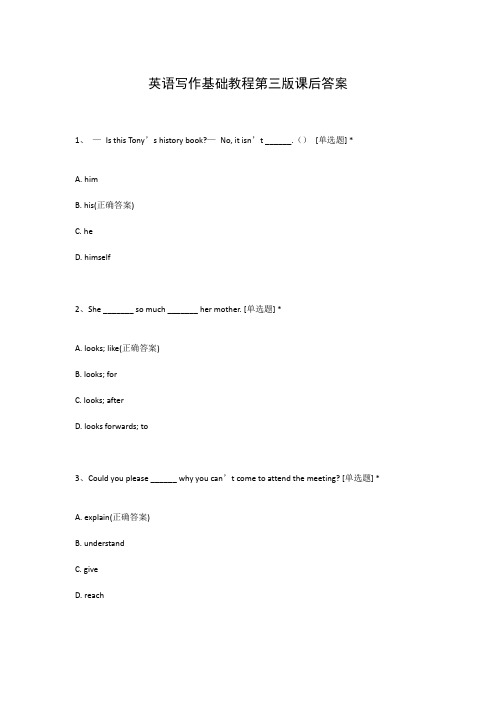
英语写作基础教程第三版课后答案1、—Is this Tony’s history book?—No, it isn’t ______.()[单选题] *A. himB. his(正确答案)C. heD. himself2、She _______ so much _______ her mother. [单选题] *A. looks; like(正确答案)B. looks; forC. looks; afterD. looks forwards; to3、Could you please ______ why you can’t come to attend the meeting? [单选题] *A. explain(正确答案)B. understandC. giveD. reach4、77.You can watch TV when you finish________ your homework. [单选题] *A.to doB.doC.to doingD.doing(正确答案)5、I’m still unable to make myself_____in the discussion, which worries me a lot. [单选题]*A.understandB.understood(正确答案)C.understandingD.to be understood6、The hall in our school is _____ to hold 500 people. [单选题] *A. big enough(正确答案)B. enough bigC. very smallD. very big7、--What would you like to say to your _______ before leaving school?--I’d like to say"Thank you very much!" [单选题] *A. workersB. nursesC. waitersD. teachers(正确答案)8、The news is?_______. We are all _______ at it. [单选题] *A. exciting;?excited(正确答案)B. excited;?excitingC. exciting;?excitingD. excited;?excited9、74.In England people drive________. [单选题] *A.on the left(正确答案)B.in the leftC.on leftD.in left10、--Whose _______ are these?? ? ? --I think they are John·s. [单选题] *A. keyB. keyesC. keys(正确答案)11、-Do you have tickets for Friday? -Sorry, we've got _____ left. [单选题] *A. eitherB. none(正确答案)C. no oneD. neither12、I’ve _______ a job interview today. [单选题] *A. haveB. had(正确答案)C. hasD. have gone to13、The Titanic is a nice film. I _______ it twice. [单选题] *A. sawB. seeC. have seen(正确答案)D. have saw14、Customers see location as the first factor when_____a decision about buying a house. [单选A.makeB.to makeC.making(正确答案)D.made15、One thousand dollars a month is not a fortune but at least can help cover my living(). [单选题] *A. billsB. expenses(正确答案)C. pricesD. charges16、_______ win the competition, he practiced a lot. [单选题] *A. BecauseB. In order to(正确答案)C. Thanks toD. In addition to17、Modern plastics can()very high and very low temperatures. [单选题] *A. stand(正确答案)B. sustainC. carryD. support18、Tomorrow is Ann’s birthday. Her mother is going to make a _______ meal for her. [单选题] *A. commonB. quickC. special(正确答案)D. simple19、Jack can speak Japanese, and his brother can _______ speak Japanese. [单选题] *A. tooB. also(正确答案)C. eitherD. as well20、( ) No matter _____ hard it may be, I will carry it out. [单选题] *A whatB whateverC how(正确答案)D however21、57.Next week will be Lisa's birthday. I will send her a birthday present ________ post. [单选题] *A.withB.forC.by(正确答案)D.in22、In winter, animals have a hard time_____anything to eat. [单选题] *A.to findB.finding(正确答案)C.foundD.to finding23、--What’s your _______, Jim Green?--Jim. [单选题] *A. full nameB. first name(正确答案)C. last nameD. family name24、Don’t read in bed. It’s _______ your eyes. [单选题] *A. good atB. good forC. bad atD. bad for(正确答案)25、In order to find the missing child, villagers _______ all they can over the past five hours. [单选题] *A. didB. doC. had doneD. have been doing(正确答案)26、______ in the library. ()[单选题] *A. Don’t smokingB. No smokeC. No smoking(正确答案)D. Doesn’t smoke27、--Miss Li, could you please help me _______ math problem?--OK. Let me try. [单选题] *A. look upB. work out(正确答案)C. set upD. put up28、Three ______ died of water pollution last winter. [单选题] *A. hundreds of villagersB. hundred villagers(正确答案)C. hundreds villagersD. hundred of villagers29、I don’t think he will take the case seriously,_____? [单选题] *A.don’t IB.won’t heC.does heD.will he(正确答案)30、These two films are very interesting. I like them _____. [单选题] *A. eitherB. neitherC. allD. both(正确答案)。
研究生英语写作教程基础级第三版答案
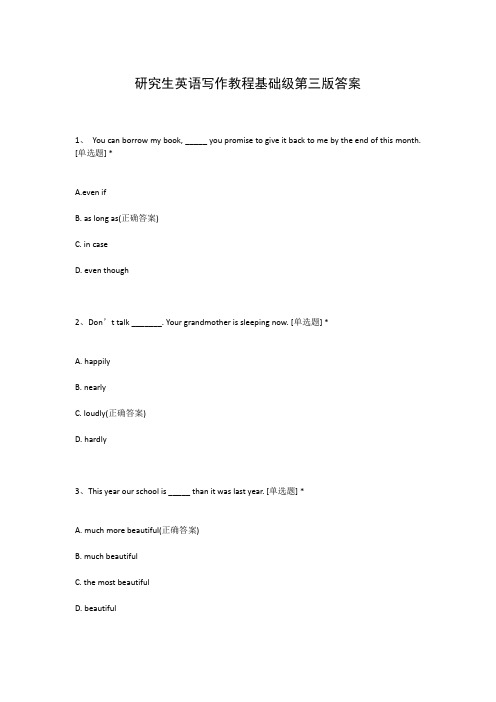
研究生英语写作教程基础级第三版答案1、You can borrow my book, _____ you promise to give it back to me by the end of this month. [单选题] *A.even ifB. as long as(正确答案)C. in caseD. even though2、Don’t talk _______. Your grandmother is sleeping now. [单选题] *A. happilyB. nearlyC. loudly(正确答案)D. hardly3、This year our school is _____ than it was last year. [单选题] *A. much more beautiful(正确答案)B. much beautifulC. the most beautifulD. beautiful4、It is my _______ to meet you here. [单选题] *A. pleasure(正确答案)B. pleaseC. pleasedD. pleasant5、_____ yuan a month _____ not enough for a family of three to live on today. [单选题] *A. Five hundred; is(正确答案)B. Five hundreds; areC. Five hundred; areD.Five hundreds; is6、34.My mother usually_______ much time shopping in the supermarkets on weekends. [单选题] *A.spends (正确答案)B.costsC.takesD.pays7、We got up early this morning and took a long walk after breakfast. We walked _____ the business section of the city. [单选题] *A. amongB. betweenC. through(正确答案)D. upon8、27.My father is a professor and he works in__________ university. [单选题] *A.a (正确答案)B.anC./D.the9、My daughter is neither slim nor fat and she’d like a _______ skirt. [单选题] *A. largeB. medium(正确答案)C. smallD. mini10、They lost their way in the forest, and _____ made matters worse was night began to fall. [单选题] *A. thatB. itC. what(正确答案)D. which11、64.Would you like to drink ________?[单选题] *A.something else(正确答案)B.anything elseC.else somethingD.else anything12、24.I often ask my English teacher some questions ________ e-mail. [单选题] * A.by(正确答案)B.inC.forD.with13、There is _______ meat in the fridge.Lets go and buy some. [单选题] *A. little(正确答案)B. a littleC. fewD. a few14、They took _____ measures to prevent poisonous gases from escaping. [单选题] *A.efficientB.beneficialC.validD.effective(正确答案)15、What about _______ there by bike? [单选题] *A. goesB. wentC. goD. going(正确答案)16、The children ______ visiting the museum. [单选题] *A. look overB. look forward to(正确答案)C. look forD. look after17、I have only two tickets for TF Boys’concert. ______ you ______ he can go with me.()[单选题] *A. Either; or(正确答案)B. Either; norC. Both; andD. Not only; but also18、( ) She keeps on learning English all the time. So far, she______three books of New Concept English. [单选题] *A. has learned(正确答案)B. have learnedC. had learnedD. learn19、Mom is making dinner. It _______ so nice! [单选题] *A. smells(正确答案)B. tastesC. feelsD. sounds20、( ) They have_____ useful dictionary. They want to lend it___ us. [单选题] *A. an; forB. a; fromC. an; toD. a; to(正确答案)21、—Is there ______ else I can do for you? —No, thanks. I can manage it myself.()[单选题] *A. everythingB. anything(正确答案)C. nothingD. some things22、Many people believe that _________one has, _______ one is, but actually it is not true. [单选题] *A. the more money ; the happier(正确答案)B. the more money ; the more happyC. the less money ; the happierD. the less money ; the more happy23、—Where ______ you ______ for your last winter holiday?—Paris. We had a great time. ()[单选题] *A. did; go(正确答案)B. do; goC. are; goingD. can; go24、Do not _______ me to help you unless you work harder. [单选题] *A. expect(正确答案)B. hopeC. dependD. think25、Though the _____ drama is wonderful, I guess most audiences will be tired as it is too long. [单选题] *A. four-hour(正确答案)B. four hoursC. four-hoursD. four-hour's26、21.Design a travel guide for Shanghai! ________ the competition and be the winner! [单选题] *A.JoinB.AttendC.EnterD.Take part in (正确答案)27、The students _____ outdoors when the visitors arrived. [单选题] *A. were playing(正确答案)B. have playedC. would playD. could play28、Be careful when you _______ the street. [单选题] *A. are crossingB. is crossingC. cross(正确答案)D. is cross29、—Whose book is it? Is it yours?—No, ask John. Maybe it’s ______.()[单选题] *A. hersB. his(正确答案)C. he’sD. her30、—What can I do to help at the old people’s home?—You ______ read stories to the old people. ()[单选题] *A. could(正确答案)B. mustC. shouldD. would。
英语写作基础教程3新

allowed in the classroom Notebook, excercise book, draft paper
英语写作基础教程3新
After each chapter
In-class quiz After-class homework Correcting and explaining of the In-class
homework
英语写作基础教程3新
教材介绍
《英语写作基础教程》(A Basic Course in Wring), 主编:丁往道、吴冰等, 高等教育出版社1998年版。 本书是作者在总结自已几十年丰富的英语写作教学经验, 研究近年国内外英语写作教学方法的基础上推出的新作。 全书共分8章,分别讲解了文稿格式和标点符号,选词, 造句,段落,摘要,作文,应用文以及学术论文的写作 的用法。
第六章 完整的作文(osing
Essays)
第七章 应用文(Writing for Practical Purposes)
第八章:论文(preparing Research Papers)
英语写作基础教程3新
Teaching focus
chapter 2: using proper words chapter 4: Developing parapraphs
英语写作基础教程3新
Content
第一章 文稿格式和标点符号
(Manuscript Form and Punctuation)
英语写作基础教程3新 PPT

learning method:
1)多读英文原文:多读什么样的文章呢?一是我们教 材中选的短文(新版教材提供了更多英文短文);二 是英美文学作品中的短文。 2)多做“模拟写作”:在我们学习英文写作的初级阶 段,建议同学们注意运用“模拟写作”这个方法,参 照同类体裁的范文,谋篇布局和行文的借鉴作用。
可以互相讨论下,但要小声点
教学目的
本课程的教学目的是培养学生初步掌握英语写作 的能力, 学会用英文写叙述文、说明性的短文和 一般性应用文。具体要求:
(1)要求学生能根据命题列出写作提纲,在约1 小时内写出不少于200词的短文, 并做到内容切题、 完整,条理清楚,语句连贯通顺, 语法基本正确。
(2)要求学生能根据提示写出通知、贺卡、便 条、申请书、邀请函、简历等, 并做到格式正确, 语言得体。
书本中的练习设计更加生动活泼针对性更本课程的教学目的是培养学生初步掌握英语写作的能力学会用英文写叙述文说明性的短文和1要求学生能根据命题列出写作提纲在约1小时内写出不少于200词的短文并做到内容切题完整条理清楚语句连贯通顺语法基本正确
英语写作基础教程3新
A Basic Course in Writing 英语写作基础教程
教材介绍
《英语写作基础教程》用清晰、浅易的英语写成, 宗旨是帮助学生掌握英语写作的基本知识和基本 技巧,提高英语写作水平。与同类书相比,本书突 出了实用和多举范例的特点,所选范文既有英、 美作家的作品,又有中国学生的习作,易于学习模 仿。书本中的练习设计更加生动活泼,针对性更 强。
大家有疑问的,可以询问和交流
英语写作基础教程第三版答案丁往道答案
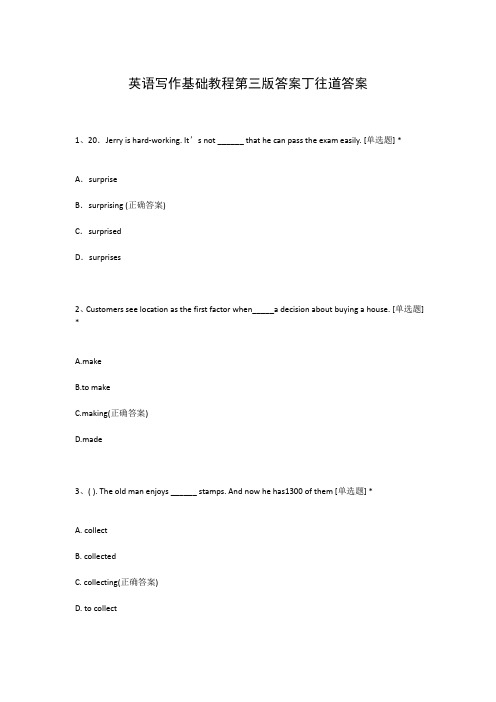
英语写作基础教程第三版答案丁往道答案1、20.Jerry is hard-working. It’s not ______ that he can pass the exam easily. [单选题] *A.surpriseB.surprising (正确答案)C.surprisedD.surprises2、Customers see location as the first factor when_____a decision about buying a house. [单选题] *A.makeB.to makeC.making(正确答案)D.made3、( ). The old man enjoys ______ stamps. And now he has1300 of them [单选题] *A. collectB. collectedC. collecting(正确答案)D. to collect4、Everyone knows that the sun _______ in the east. [单选题] *A. fallsB. rises(正确答案)C. staysD. lives5、一Mary wants to invite you to see the movie today. 一I would rather she(B)me tomorrow. [单选题] *A.tellsB. told (正确答案)C. would tellD. had told6、( ) .Would you please ______me the gifts from your friends? [单选题] *A.to showB. showingC. show(正确答案)D. shown7、John had planned to leave, but he decided to stay in the hotel for()two days because of the heavy rain. [单选题] *A. otherB. the otherC. another(正确答案)D. others8、87.—Could you? ? ? ? ? ? me the way to the nearest hospital?—Sure. [单选题] *A.askB.tell(正确答案)C.talkD.speak9、I _______ play the game well. [单选题] *A. mustB. can(正确答案)C. wouldD. will10、18.Monica wants to be a _______. She is good at sports and she loves teaching others. [单选题] *A.coach(正确答案)B.secretaryC.architectD.waiter11、The language school started a new()to help young learners with reading and writing. [单选题] *A. course(正确答案)B. designC. eventD. progress12、Don’t forget _______ those books when you are free. [单选题] *A. to read(正确答案)B. readingC. readD. to reading13、It is reported()three people were badly injured in the traffic accident. [单选题] *A. whichB. that(正确答案)C.whileD.what14、-We’ve spent too much money recently–well,it isn’t surprising. Our friend and relatives_______around all the time [单选题] *ingB. had comeC. were comingD have been coming(正确答案)15、86.—? ? ? ? ? ? ?will it take me to get to the Golden Street?—About half an hour. [单选题]*A.How farB.How long(正确答案)C.How oftenD.How much16、Jack can speak Japanese, and his brother can _______ speak Japanese. [单选题] *A. tooB. also(正确答案)C. eitherD. as well17、--Could you please tell me _______ to get to the nearest supermarket?--Sorry, I am astranger here. [单选题] *A. whatB. how(正确答案)C. whenD. why18、Grandfather lives with us. We all _______ him when he gets ill. [单选题] *A. look after(正确答案)B. look atC. look forD. look like19、He _______ maths. [单选题] *A. does well in(正确答案)B. good atC. is well inD. does well at20、8.Turn right ________ Danba Road and walk ________ the road, then you will findMeilong Middle school. [单选题] *A.in...alongB.into...along (正确答案)C.in...onD.into...on21、______ my great joy, I met an old friend I haven' t seen for years ______ my way ______ town. [单选题] *A. To, in, forB. To, on, to(正确答案)C. With, in, toD. For, in, for22、You should _______ fighting with your parents although you may have different ideas from time to time. [单选题] *A. suggestB. enjoyC. avoid(正确答案)D. practice23、At half past three she went back to the school to pick him up. [单选题] *A. 等他B. 送他(正确答案)C. 抱他D. 接他24、I _______ seeing you soon. [单选题] *A. look afterB. look forC. look atD. look forward to(正确答案)25、Mr. Wang is coming to our school. I can’t wait to see _______. [单选题] *A. herB. him(正确答案)C. itD. them26、The travelers arrived _______ Xi’an _______ a rainy day. [单选题] *A. at; inB. at; onC. in; inD. in; on(正确答案)27、I’d like to go with you, ______ I’m too busy. [单选题] *A. orB. andC. soD. but(正确答案)28、Ships can carry more goods than _____ means of transport. [单选题] *A. the otherB. anotherC. any other(正确答案)D. any29、I should like to rent a house which is modern, comfortable and _____, in a quiet neighborhood. [单选题] *A.in allB. after allC. above all(正确答案)D. over all30、2.The villagers want to have a bridge. Can this dream ________? [单选题] *A.come outB.get awayC.come true(正确答案) D.get out。
英语写作教程第三章

9
• Write a CV (or resume个人简历). Introduce yourself and you should write about 200 words.
• Ⅲ. The basic features of an effective sentence • 1. Unity--- A unified sentence expresses a single complete thought.(P.61) • 2. Coherence---It means clear and reasonable connection between parts. A sentence is coherent when its words or parts are properly connected and their relationships unmistakably clear. • It is not coherent if it has faulty parallel constructions, pronouns with ambiguous reference, dangling or misplaced modifiers, confusing shifts in person and number, or in voice, tense, and mood.(P.62)
C) Comቤተ መጻሕፍቲ ባይዱlex sentence
• A complex sentence has an independent clause joined by one or more dependent clauses. A complex sentence always has a subordinator(从属连词) such as because, since, after, although, or when or a relative pronoun such as that, who, or which.
写作教程3unit1答案

写作教程3u n i t1答案本页仅作为文档封面,使用时可以删除This document is for reference only-rar21year.MarchPart A GRAMMARSubject- Verb AgreementSubject-verb agreement is a very complicated issue and it is not our intention to cover all the ground in this unit. What we attempt to do here is to bring students' attention to some points particularly tricky and let them learn by practice. The method we use in the grammar section of this book is the discovery approach -- to let students find out their own answers. We hope this can raise students' interest in learning grammar and sharpen their inductive skills.The question of subject-verb agreement is very complicated. Generally speaking, there are three basic principles: grammatical agreement, notional agreement, and the principle of proximity. In his unit, we are going to approach this issue in four contexts:When the subject is compoundReference for the Classroom ActivitiesSummary:1. A compound subject with and takes a plural verb in most cases, but when itexpresses a singular meaning or when each of the singular subjects is considered individually, it takes a singular verb.2.After a compound subject with or, nor, either…or, neither…nor, not …but,theverb agrees in number and person with the nearer part of the subject.3.Intervening phrases or clauses not introduced by coordinating conjunctions donot affect the number of a verb. Such phrases are normally introduced by prepositions or prepositional phrases such as well as, as much as, rather than, along with in addition to, together with, with, plus, and including.When the subject expresses quantityReference for the Classroom ActivitiesAll the sentences are correct.Summary:1.Nominal phrases of time, money, weight and measurement normally take asingular verb.2.Some words or phrases, such as all, most, half, the last, the rest, take a singularor plural verb, depending on the meaning of the noun or pronoun that follows.3.Phrases lik e lots of, heaps of , loads of take singular or plural verbs depending onthe form of the nouns that follow.4.In sentences with more than one or many a modifying the subject nouns, theverb should take a singular form though it is plural in meaning.When the subject is a relative pronoun, a what-clause, or in the there-be structure Reference for the Classroom Activities1). He was one of the candidates who were able to carry out their campaign pledges. He was the only one of the candidates who was able to carry out his campaign pledges2). What he wants is just a little love from his foster parents.What one thinks and says are not always the same.3). There is a cherry tree and several orchid flowers in the garden.There are hundreds of applicants on the waiting list for the job.Summary:1.After a relative pronoun (who, which, that), the verb has the same person andnumber as the antecedent. (In the second sentence in Pair a, the antecedent is the only one, not the candidates.)2.After a what-clause, the verb is usually singular,. But if the what-clause is in acompound structure plural in meaning, the verb is in plural form.3.In the there-be structure, the verb is singular or plural depending on the numberof the subject. The singular there is may be used to introduce a compound subject when the first noun or nominal phrase is singular.OthersReference for the Classroom Activities1). Nobody in town admits seeing him.2). Does anyone want to go with me3). Are any of you going to the exhibition4). None works/work so hard as he does.5). Books are her chief source of enjoyment.6). The one thing you must be ready for is their attempts to break up the meeting7). The jury is finally complete.8). The jury were divided in their Opinions.9). New York Times is his bible.10). Semantics is the study of meanings.Summary:1.Indefinite pronouns such as anybody, anyone, each, everybody, nobody, no one,and somebody generally require a singular verb.2.The pronouns any and none take either singular or plural verbs.3.The complement of the verb be does not affect its number.4. A collective noun takes a singular verb when the class it names is thought of as aunit, but a plural verb when the members of the class are thought of as individuals.5.Titles of books, magazines, movies, newspapers, plays, and the like take asingular verb.6.Certain nouns which are plural in form but singular in meaning generally take asingular verb. Some of these are physics, mechanics, news, statistics,and whereabouts.Part B Keys to the FOLLOW-UP EXERCISES1. 1). The little boy was chicken-hearted.2). That statesman is a respectable figure in the political arena.3). We sat down by the oak tree, enjoying the breeze coming from the lake4). We need to drink the milk before it sours.5). The child had difficulty finding his way to school.6) The young woman received a lot of flowers and gifts.7). My father drew back the curtain a little lest I see him.8). Our university can accommodate 4,000 students.9). Social customs vary greatly from country to country.2. The writer's attitude changes from negative to positive in each pair of sentences3. (1)experienced (2) elapsed(3)attempting (4) with(5)take up (6) made(7)endeavor (8) true4. 1). The state attorney said that the man would be prosecuted.2). We suppose that a referee should be disinterested but not uninterested3). Tony can hit a ball farther than I can.4). We must pursue this matter further.5). The principles behind our constitution are a principal reason for its astounding success.6). Al1 the band instruments except the tuba will be carried to the auditorium for the music contest.7). The federal government comprises the legislative, judicial, and executive branches8). The whole region was struck by an economic disaster.9). (correct)10). He was awaked to the risk.5. My sister Lulu accepted a scholarship to study in the UK. She had done very well in school and the principal thought that living with a British family would teach her a lot. Mother said she would let her go if she bought a box of stationery and promised to write home every week. She said that she would live up to her promise and she always does pretty well in living up to her principles. Soon after she arrived in the UK., she adapted to her new environment. Her new life did not affect her a great deal. She knew that as a student she had to be economical and she was not self-conscious of her poor clothing and strange accent. These were the things she was uninterested in; what fascinated her instead was the cultural differences between the two countries. She found people there liked to pay compliments andwere more credulous to what she said. Of course, she never lied to them about her motherland.Though she experienced cultural shocks continually, she developed a fair attitude towards the other culture. In the proceeding years, she settled down in the UK. and became a person with an alternative cultural identity.6. 1). Sixty hours is the amount of work time I contracted for.2). The jury is expected to reach its decision very quickly.3). Each of the candidates for the position has exceptionally high qualifications.4). Every boy and girl in the sixth grade was/is eager to win the contest.5). Corn bread and milk is a popular breakfast in the rural South.6). The instructor as well as the students was at fault.7). He is one of the students who plan to attend the speech contest.8). The jury are to be isolated in individual hotel rooms each night during the trial9). Sam sprawled in the chair and knocked over one of the lamps which were on display10). The symptoms of mercury poisoning vary with each individual case.11). He believes that athletics improves school morale.12). Up goes the starter's gun, and each of the runners becomes tense.13). Either The Times or The Tribune is a reliable source of news.14). The first thing that catches your eye is the headlines.15). She is one of the women who have made this country what it is.7. As a way to wind up the unit, ask students to write a note for each of the situations. This can be done as homework.Part C Complementary of Notes(12) Notes of SuggestionBelow is an example of a note of suggestionDateDear ____,You have asked me for my advice with regard to _________, and I will try to make some constructive suggestions. I think it would be better if ______. … I do hope you can take my suggestion into consideration.Your sincerely ,NamePart D Assignment for this weekAssignment: The question 7 of Page 27 in your text book.Please finish both of questions and hand in next time.。
英语写作基础教程(chapter-3)01ppt课件
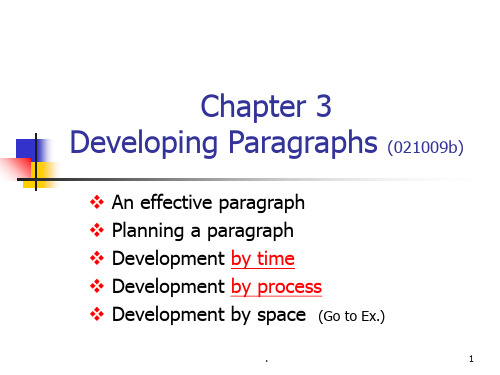
.
1
An effective paragraph
❖ 3 features of an effective paragraph: 1. A paragraph should have one, and only
one, central idea. 2. The main idea is generally expressed in
(ways of developing paragraphs)
.
4
Development by Time
In telling a story or recounting an event, the easiest and clearest way is to describe things in order of time; earlier things are mentioned before later things, the first thing first and the last thing last. This method is also called chronological sequencing.
.
6
Development by Process
When you have to explain how something is done, you usually follow a chronological sequence and give a step-by-step description. As the steps must occur one after another, the exact order in which they are carried out is most important. In giving instructions, imperative sentences and sentences
- 1、下载文档前请自行甄别文档内容的完整性,平台不提供额外的编辑、内容补充、找答案等附加服务。
- 2、"仅部分预览"的文档,不可在线预览部分如存在完整性等问题,可反馈申请退款(可完整预览的文档不适用该条件!)。
- 3、如文档侵犯您的权益,请联系客服反馈,我们会尽快为您处理(人工客服工作时间:9:00-18:30)。
英语写作基础教程A Basic Course in Writing主讲: Priscillapan教学大纲一. 教学对象本课程的教学对象是高等专科英语专业的学生或具有同等水平的自学者._二. 教学目的与要求通过本课程的教学, 使学生初步掌握英语写作技能, 学会用英文写叙述,说明性的短文和一般性应用文.(1) 用英文写叙述,说明性的短文: 要求学生能根据命题列出作文提纲,在1小时内写出不少于200词的短文, 内容切题,完整,条理清楚,语句连贯通顺, 语法基本正确.(2) 用英文写一般性的应用文: 要求学生能根据提示写出知,贺卡,便条,申请书,邀请函,简历, 格式正确, 语言得体._三. 教学安排本课程3个学分, 在一个学期内开设, 每周3学时,共计54学时._四. 教学内容本课程主要教学内容如下:(1) 文稿格式;(2) 句子结构;(3) 构段方式;(4) 谋篇布局;(5) 摘要;(6) 应用文._五. 教学原则(1) 在教学过程中, 要充分考虑成人学习的特点和本课程的特点, 注重对学生遣词造句这两种能力的培养;(2) 在教学过程中, 教师应以指导学生自学为主, 以电视教学和课堂教学为辅, 采用多种教学手段对学生进行写作训练._六. 测试_实行全国统一的闭卷考试.考试采用百分制,60分及格.实施方案一,课时安排____"英语写作基础"课内总学时为54小时,课外练习时数为54小时.二,具体学习安排___ (一)基本技能的学习:6课时,要求掌握标点符号的用法.__ (二)句子的写作:9课时,要求掌握句子统一性,连贯性,重点突出的写作技巧. __ (三)段落的写作:6课时,要求掌握段落统一性的写作,学会主题句和扩展句的运用.__ (四)一般性文章和应用文的写作:30课时,要求掌握基本应用文的写作,这是本课程的重点部分(具体内容附后).__ (五)期末复习:3课时,全面复习本学习的教学内容,模拟考试.三,教学意见____ 1) 作文课应该以教师讲解,学生练习为主.___ 2) 授课重点应该放在写作技能技巧的训练上,理论知识可以适当少讲.___ 3) 有条件的分校可以充分利用网上资源和现代技术设备,利用互联网上的英语写作网站扩大学生的阅读两;利用视频展示台把学生所写的优秀文章向全班批改,也可以讲普遍性的问题;等等.考试题型一,考试题型与要求___ 本课程的考试依据教学大纲的要求,重点考查应用文写作和一般文体的写作.考试为闭卷考试,总分为100分._____ 1.应用文写作___ 根据提示写一个不少于50词的通知和一个不少于100词的便条,要求语言通顺,用词得体,格式正确.满分为30分;_____ 2.命题作文___ 根据所给题目及写作提纲或规定场景等,写一篇不少于200词的作文,要求符合文章类型特点,内容切题,语言通顺.满分为70分.二,考试模拟试题一,Write a notice into the box according to the following facts:(10分) ____乒乓球赛___ 地点: 1号球室:___ 北京商业学校对北京语言文化大学___ 时间:5月8日用六下午五时二,Write a note based on the given facts:(20分) :____ 时间:6月9月____ 对象:Prof. Stone_____ 内容:对不起,不能赴3点的约会.我的论文由,于被朋友锁上了,不能带来.我不知他何时返回.如果方便,我能在明日下午五时在系办公室见您吗若不行,请明早特便条放在我的信箱里,信箱号606.谢谢._____ 留言者:吴敏三,Write an essay of no fewer than 200words:(70分) :________ Title:_ Qualification of a Good University Student________ Aids:________ First Paragraph:_Your point of view of being a good university student________ Second Paragraph: What makes a good university student (with some examples)________ Third Paragraph:_Conclusion平时作业英语写作基础平时作业(大作业)共四次,主要检查同学们对英语应用文写作的掌握情况.__1)完成P125页Exercise 1 (Notice Writing)2)完成P126页Exercise 3 (Note Writing)3)完成P126页Exercise 4 (Letters Writing)4)完成P126页Exercise 5 (resumes Writing)___另外,任课教师可以根据教学内容,适当补充写作练习.General Remarks on Writing_Writing _makes an exact man._Great use and popularity_Needing Much Knowledge_Useful for Reading and Spoken_Great Difficulties as wellTargets of this CourseAt the end of this course, you should be able:_to use the punctuation marks correctly;_to write correct sentences;_to write more effective sentences ;_to compose a full essay;_to write a practical essay like a note, a letter, or a notice etc. Arrangement_ I Writing the titleII Leaving the marginsIII ParagraphingIV CapitalizationV Dividing wordsWriting the titleBe placed in the middle of the first lineEvery word of the title should be capitalizedNo full stop should be used at the end of a titleMarginsA. leave margins at the top and bottom and on the side of each page. Never write on a full page.B. left side margin should be wider if the work is to be bound.C. For students, it is advisable to write on every other line. ParagraphingA. Indentation (Space)… … … … … … ..… … … … … … ..… … … … … … ..… … … … … … ..… … … … … … ..B. Block… … … … … … ..… … … … … … ..… … … … … … ..… … … … … … ..… … … … … … ..HandwritingRegrettably, an English writer is not so concerned with the aesthetics in handwriting as a Chinese writer is. Be neat and legible.A. Make your "t"s different from your "e"s;B. Make your "r"s different from your "v"s;C. If cross out a word, no brackets but a thick line across it;D. If add a word, write it above, not below;E. Two common ways of writing the letters: form loops and print SyllabificationWhen you happen not to have enough room to write a whole word in at the end of a line:A. If the word is monosyllabic, please write it in a next line;B. If the word is polysyllabic, you maybe syllabify it if you feel necessaryHow to syllabify a wordJust splitting a word then a hyphen then the other part of the word. occupation: oc-cu-pa-tion( Don't split it like this: occ-upa-tion)Nowadays, a computer deals with this problems automatically Abbreviations and NumeralsAbbreviations shorten some words, titles and long names. They are used in advertising and informal occasions.1) Be sure to use them before you know.2) Be sure of the dots ( . ).Abbreviations1)___ Before names (family names), titles are abbreviated:Mr. Green Ms. Adella Dr. Bethune2)___ Titles of academics, government officials, and priest can be abbreviated, followed by the full name:Prof. Li Gov. Henry Ford Sen. Robert3)_____ Academic degrees and family designations preceded by full names can be abbreviated:Robert Smith, Ph. D. John Jones Jr./Sr.4) Names of well-known organizations, firms, places, and long technical terms can be abbreviated by using the initial letters of the words:UNESCO FBI WHO TOEFL GATT5)_____ Time designations when used with specific numbers are abbreviated:135 B.C. 6:00 a.m.6) Words referring to portions of address can be abbreviated when they appear in address on envelopes, letter headings, or inside addresses:Rd. Dept. Pro. P.R.C.Capitalization1)The use of capitalization is unique and important in writing.(1) The china made in China is first class.(2) he bought that article of japan in Japan.(3) Their child was shanghaied in Shanghai.(4) John wanted to go to the john.(5) The turkey here is not as good as in Turkey. _2)The capitalization is used in the following 10 aspects:(1) the beginning of a sentenceWonderful!Where there is a will, there is a way.Can you hear me at the backCapitalization(2) For the first letter in each line of a poem.The Arrow and the SongI shot an arrow into the sky,(3) The first letter of a directed quotation / speech:"Who is on duty today " the teacher asked." Don't worry," he said, trying to comfort me. " We will help you make up for the lessons."(cf. "To be frank with you," he said, "you should not have told him that."Capitalization(4) The first letters of the essential words in proper nouns ( names of people, countries, organizations historical events, planes, etc.) Darwin ShakespeareChina Jesus Christthe Great Wall the Red CrossBoeing 747(5) The first letters of designation of relatives before family names: Uncle Geoge Aunt MaggieNiece Mary Grandma LeeCapitalization(6) Almost all abbreviations except a.m., p.m., etc., e.g., c/o, i.e., tec(7) the first letter of essential word in trade marks, service signs, posts, greetings, etc.Information Desk Hands OffOpen Strictly No Smoking(祝你生日快乐!)Happy birthday to you!Happy Birthday to you!(8) the title of all significant words in the title of a theme, article, essay. newspaper, periodical. But a form word of less than five letters is not capitalized unless it begins the title.Jane Eyre Gone with the WindMy College LifeCapitalization(9) the first letter of the salutation and complimentary close in a letter: Dear Sir, Dear Mr. Evans,Sincerely yours, Yours,(10) the first letter of the words of the days of a week, the month, and the major words of holidays:PunctuationMain Punctuation marks1. the period(.)2. the question mark ( )3. the exclamation point (!)4. the comma (,)5. the semicolon (;)6. the colon (:)7. brackets ([ ])8. the quotation marks (" " ' ')9. parentheses ( ( ) )10. The dash (―)11. ellipsis points ( … )The Period ( . )1. The period (full stop) is used at the end of a declarative sentence,a mildly imperative sentence, and an indirect question.Honesty is the best policy.Hand in your homework, please. .The period marks the end of a sentence. The word after it begins a new sentence and has to be capitalized.She graduated from Oxford University. She achieved great success in her studies there.2.The period is used with most abbreviations.But some people prefer not to use the period with abbreviations. They just write Mr, Ms, etc. Names of well-known organizations, broadcasting corporations are often written without periods, like UN, UNESCO, NATO, VOA, BBC.3. Three spaced period make the ellipsis mark, which indicates the omission of one or more words within a quoted passage, or pauses in speech;Um… I think, um… she is um… pretty um… hardworking.The Comma ( , )1. A comma is used to join coordinate. It is put before the conjunction (and, but, or, for, so, nor, or, yet,):We wanted to go on, but other people disappeared.He tried hard, yet he failed to convince her.We should remember that coordinate clauses have to be joined with a comma and a conjunction. One comma alone cannot do the jobthough it is possible in Chinese.Sam is four years old, he is quite bright.Sam is four years old, and he is quite bright.Using a comma to link two clauses is a common mistake, which has a name: the comma fault or the comma splice. But we can use a semicolon, a dash, or a colon between two coordinate clauses.Sam is four years old; he is quite bright.Sam is very happy: he's got the first prize.The Comma ( , )2. A comma is used after an adverbial clause or phrase.When the rain stopped, we continued to work in the fields.On hearing the news, she went faint.Some listeners, bored by the lengthy talk, closed their eyes and dozed.3. Commas are used to separate a series of words or phrases with the same function in the sentence.The comma before the conjunction and last item is optional. It can be omitted there is no danger of misreading.The children sang, danced, jumped, and chased each other.4. Nonrestrictive clauses and phrases are set off by commas. Restrictive clauses and phrases are not set off by commas.The speaker, after glancing at his notes, began to talk about the next point.The Comma ( , )5. In dates, a comma is used to separate the day and the year if the order is month-day-year; no comma need be used if the order is day-month-year.Hong Kong was returned to China on July 1, 1997.She was born on 15 September 1980.6. With numbers over 1,000 or more, commas or little blank spaces may be used to separate digits by thousands. From right to left, a comma is placed after every three numerals.12,221,548 53,507,214The question Marks ( )1. The question mark is used after a direct question.Do you know Mr. Smith"Could you please explain to me the meaning of this sentence " she asked.2. The question mark is used after a statement turned into a question ( said in a rising tune ).You like it You want to buy itThe first time to the United States3. A question mark put between parentheses indicates the writer's uncertainty about the correctness of the preceding word, figure or date.Cao Xueqing was born in 1715 ( ), and died in poverty in 1764 ( ). The Exclamation Mark ( ! )1. The exclamation mark is used after an exclamatory sentence, or an emphatic interjection, or a phrase expressing strong emotion.Wow! What beautiful flowers!Help!It is on fire!The exclamation mark indicates strong emphasis and therefore it should be used sparingly. It is preferable to close a mild interjection with a comma or a period.(Do not use it frequently!)2.Sometimes the exclamation mark is used after a slogan.Long live the Peoples Republic of China!NATO Out!The Semicolon ( ; )1. The semicolon is used between two coordinate clauses which are not linked by a conjunction.We wanted to go on, but other people disappeared.She was interested in history years ago; today her main interest is art. Each of the above two sentences can be turned into two separate sentences without any change in meaning except some lack of closeness in them.2. Conjunctive adverbs like therefore, however, nonetheless, hence, otherwise, besides, moreover, etc., should not be used as conjunctions to link two coordinate clauses. Before them there should be a semicolon, not a comma.He promised to come the meeting; however, she would been caught in the storm.3. The semicolon is used with conjunctions when the clauses contain internal punctuation.4. A comma is used to separate a series of items with internal commas. The Colon ( : )1. The colon is used to introduce a quotation or a statement .It will do everyone good to remember this old saying: " One will know that he does not know enough after he begins to learn."2. ThSentence WritingRequirements for a correct sentence:It should be structurally complete.It should begin with a capital letter.It should end with a full stop, or a question mark, or an exclamation mark.It should express a single complete idea.Correct SentencesCompleteness in StructureA grammatically complete sentence is one that contains at least a subject and a predicate verb(谓语动词)and it begins with a capital letter and ends with a full stop.If the verb is transitive(及物动词), there must be an object; if the verb is a link verb(系动词), there must be a predicative(表语) or complement(补语).Examples(√) We have a lesson on Monday night.(√)To think about the gift makes me happy.(√) After this meal, they were ready to set out.(×)Hoping she would accept his apology.(×)A school that was a bad experience.(×)With no difference except the color.The Right Subject1) Not knowing his name, it was difficult to introduce him.2) To look at a map, the importance of the road is seen.3)Stuck in the mud, they had to push the car.In the above sentences the subjects are not properly related to the gerunds, participles or infinitive in the first parts of the sentences.Agreement Between S. (subject) & P. (predicate verb)The predicate verb of a sentence has to agree with the subject in person and number.Collective nouns like family and audience may be either singular or plural, depending on the meaning in which they are used. If you think of family, government, etc. as one whole, a singular verb is needed. If you think of them as made up of a number of people, a plural verb is needed.The whole family are going out for BBQ.This family is the happiest one in our town.There is a great audience in the playground.The audience are shocked by the news.When two subjects refer to different persons or are different in number, the verb should agree with the subject close to it.Neither he nor you are arriving at the right time.There is a pen and four books on the desk.Words after together with, in addition to, besides, etc., are objects of prepositions; they do not affect the number of the subject.The plays, as well as the captain, want very much to win.A subjectclause generally takes a singular verb, but a what-clause which clearly refers to many things can take a plural verb.How he manages to do it remains a mystery.What he wanted to know were the pay, the living and working conditions.Agreement Between Pronoun & AntecedentJust as the predicate verb of a sentence has to agree with the subject in person and number, so a pronoun has to agree with its antecedent. After a compound antecedent with or, nor, either…or, neither…nor, not only…but also, a pronoun agrees with the nearer part of the antecedent.A singular pronoun follows a collective noun antecedent when the members of the group are considered as a unit; a plural pronoun, when they are thought of individually.The jury was asked to return to their seats.For such singular antecedents as each, either, neither, one, no one, everyone, someone, anyone, nobody, everybody, somebody, and anybody, which may refer to both male and female, she or he, his or her, him or her, or the preferred plural pronouns they, their or them are used.Clear Pronoun Reference1) She told my sister that her idea was practical.2) Leave out the word in that sentence because it is too difficult.We use personal pronouns very often. They seem to be easy, but they should be used with care. We beginners often make mistakes in using "it". Ending sentenceswith full stopsTo join two or more complete sentences with commas may be possible in Chinese, but it is wrong in English. When a sentence is structurally complete, whether long or short, it should end with a full stop.For example:He went out on Sunday. He met his friend in the street. They talk for a while. Then they said "goodbye".When he went out on Sunday, he met his friend in the street. Theytalk for a while and then they said "goodbye".Joining clauses with conjunctionWhen two or more sentences are closely connected in meaning, it may be better to put them into one sentence than separate them. Then those sentences will become clauses which should be joined together with proper conjunctions or other words, like relative pronouns.We should distinguish between conjunctions and adverbs, such as but and however, so and therefore. We can join coordinate clauses with a comma and a conjunction, or with a semicolon, or with a semicolon and an adverb.Mom washed the dishes; and I dried and put them away.Some of the food crops failed, but the cotton did quite well.Some of the food crops failed; however, the cotton did quite well.A main clause in a complex sentenceIn a complex sentence there must be a main clause, whether it is at the beginning, in the middle or at the end of the sentence.Proper use of comparisonsAdjectives or adverbs of the comparative degree should be used only when there is a comparison.We should not use adjectives or adverbs of the comparative degree when there is no comparison, explicit or implied.In addition, we should remember that only things of the same kind can be compared.For example:This course seems more difficult.China's population is larger than India's.After many years Bill remembered me better than Carl did. Correct Use of TenseWhenever we make a sentence, we should ask ourselves when the thing mentioned happens, and the right tense to report it.1) He told/tells me that he is much better now.2) She returned the book I lend/lent to her yesterday.3) Last time we saw a film, and it is/was a good one.Types of SentenceAccording to their use, we have ―1) declarative sentences. (陈述句)2) interrogative sentences.(疑问句)3) imperative sentences.(祈使句)4) exclamation sentences. (感叹句)According to their structure, we have ―simple sentences. (简单句)2) compound sentences. (并列句)3) complex sentences. (复合句)4) compound-complex sentences.(并列复合句)Types of SentenceFrom a rhetorical(修辞) point of view, we have ―1) loose sentences. (松散句)2) periodic sentences. (工整句)3) balanced sentences. (对杖句)4) Short and long sentences (长短句)Coordination(并列) and Subordination(从属)When we mention two or more things or ideas of equal importance, we often use coordinate clauses joined with a coordinating conjunction (and, but, or, nor, yet, so, or for). (coordination) When we express an important idea in a main clause and one or more less important ideas in subordinate clauses, we are using the method of subordination.The choice of coordination or subordinations mainly decided by the relationship between the ideas to be expressed.Effective SentencesUnity (统一性)Coherence (连贯性)Conciseness(简洁性)Emphasis (有重点性)Variety (多样性)Unity (统一性)Unity is the first quality of an effective sentence. It refers to two qualities: there is only one main idea in a sentence, and that idea is complete.Ideas that are closely connected can be expressed in one sentence, while ideas that are not closely connected should not be put into one sentence.1)_ Born in a small town in South China in the early 50s, he grew up to be a famous musician. (×)2)_ He is from Hebei, and I am 22 years old now.(×)Coherence (连贯性)Coherence means clear and reasonable connection between parts. A sentence is coherence when its words or parts are properly connected and their relationship clear.Do not separate words that are closely related;Do not use a pronoun with ambiguous reference;Do not use a dangling modifier;Do not make confusing shift in person and number;Do not make unnecessary changes in tense, voice, or mood.Do not use different forms to express parallel ideas.For example:1) A man is judged not only by what he says but also by his deeds (by what he does ).2) We thought she was charming, intelligent, and a very capable young woman (a charming, intelligent and capable young woman).3) After listening to the speaker's inspiring speech, many questions were raised. (we raised many questions.)4)_She told my sister that she( who is she) was wrong.5)_He was knocked down by a bike, but it( ) was not serious.6)_ read an interesting story in a magazine about sportsmen. (not a sentence at all)Conciseness(简洁性)A sentence should contain no unnecessary words. If the idea if fully expressed, the fewer words are used, the better.Use a pronoun instead of repeating a noun.Use a word instead of a phrase with the same meaning, and use a phrase instead of a clause with the same meaning.Do not repeat words or phrases, if possible, in a sentence or in one that follow.Do not use different words or phrases with similar meanings in the same sentence.Do not repeat the same idea in different sentences except for emphasis.Wordy sentences and redundant words can only make the meaning hazy and the main points inconspicuous. It is always necessary for us to reread what we have written and try to improve it by simplifying it and making it more concise.For example:1) My father has returned back from Beijing.2) It is blue in colour.3) In my opinion, I think you are right.4) Mary is a quiet and careful woman.5) Mr. Smith likes to drink all kinds of wine that are produced in France. (French wine)6) The language lab is open to students not only from English Department but also from other department of the university.7)My father is 65 years old, and he is a professor in Hunan University. He has a healthy body of his age.My father, a professor of 65 years old in Hunan University, enjoys the best of_ health._ (用同位语改写)Emphasis (有重点性)Placing:The end and the beginning , especially the end, of a sentence usuallyattract readers' attention, so important elements of a sentence should be put at these two places, especially the end.For example:1) The teacher nodded with satisfaction when he was listening to her. The teacher, while listening to her, kept nodding with satisfaction.2) The plane circled around the airport for ten minutes and then disappeared in the clouds.After circling around the airport for ten minutes, the plane disappeared in the clouds.Climactic sequenceIn enumerating things or ideas, we should start from the least important and end with the most important, or in the climactic sequence.For example:He said he had lost interest in life, fame, position and money after that tragedy.He said after tragedy he had lost interest in money, position, fame, and even life.The use of verbs in the active voiceVerbs are generally more emphatic than nouns or any other part of speech.For example:The work was finished by them last night.They finished the work last night.But when the receiver of an action is more important than the doer, the passive voice is preferable.When she got off the bus, lots of people welcomed her warmly. When she got (getting) off the bus, she was warmly welcomed by lots of people.Subordination(使用从属结构)Subordinating a part of a sentence is a way of giving emphasis to the main part / idea of the sentence.For example:A plane is wheeling over the city.A plane is wheeling over the city, producing a big noise that surprised the inhabitants.Repeating important wordsRepetition as a rule should be avoided, but occasionally important words can be repeated for the sake of emphasis:For example:1) He speaks German well. His written German is also good.He speaks German well; he also writes German well.2) The Government praises itself in every possible way, but the Opposition says ugly things about it whenever possible.The Government praises itself in every possible way (whenever possible), but the Opposition says ugly things about it in every possible way (whenever possible).Negative-positive statementsWhen a negative statement is followed by a positive one, the meaning is emphasized by the contrast.For example:1)She does not care too much about prices; she thinks the quality of things is more important.She does not care too much about prices; she cares much about the quality.2) These children are busy playing with toys. They have little time for studies.Busy playing with toys, these children have little time for studies. Rhetorical questionsRhetorical questions are questions in form but emphatic statements in meaning. They are not asked to be answered.For example:Didn't I tell you not to be lateWhat are you talking about Nonsense.Is that what you are going to give meVariety (多样性)It is often good to vary sentence structures and mix short long, simple and compound or complex, loose and periodic sentences, so long as the meaning is properly expressed. A series of sentences of the same structure and length with the same noun or pronoun as the subjects produce monotony.For example:1)She hurried down to the bank, withdrew all her savings, and gave them to her old mother.Hurrying down to the bank, she withdrew all her savings and gave them to her old mother.2)When they saw the curtain go up, the audience gasped in surprise and started applauding loudly.Seeing the curtain go up, the audience gasped in surprise and started applauding loudly.Or: The audience saw the curtain go up, gasped in surprise, and started applauding loudly.。
